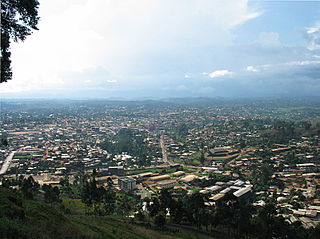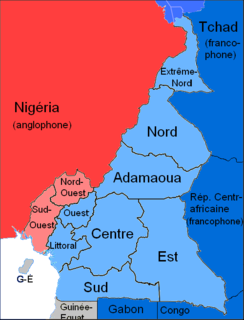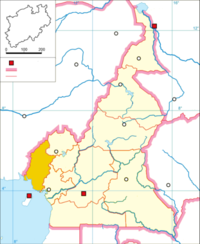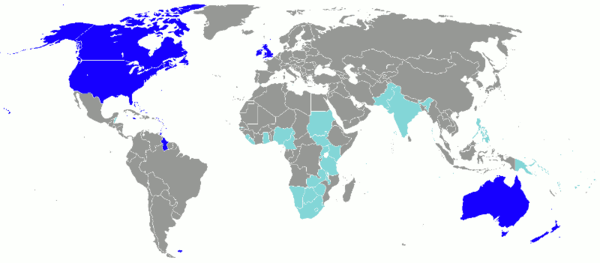
Cameroon, officially the Republic of Cameroon, is a country in west-central Africa. It is bordered by Nigeria to the west and north; Chad to the northeast; the Central African Republic to the east; and Equatorial Guinea, Gabon and the Republic of the Congo to the south. Its coastline lies on the Bight of Biafra, part of the Gulf of Guinea and the Atlantic Ocean. The country is sometimes identified as West African and other times as Central African, due to its strategic position at the crossroads between West and Central Africa. Its nearly 25 million people speak 250 native languages.
International English is the concept of using the English language as a global means of communication similar to an international auxiliary language, and often refers to the movement towards an international standard for the language. Related and sometimes synonymous terms include: Global English, World English, Common English, Continental English, General English, Engas, and Globish. Sometimes, these terms refer to the actuality of the situation, where English is spoken and used in numerous dialects around the world. These terms may acknowledge the diversity and varieties of English spoken throughout the world.

The Northwest Region, or North-West Region is one of ten regions in Cameroon. Its regional capital is Bamenda. The Northwest Region is part of the Southern Cameroons, found in the western highlands of Cameroon. It is bordered to the southwest by the Southwest Region, to the south by the West Region, to the east by the Adamawa Region, and to the north by Nigeria. Various Ambazonian nationalist and separatist factions regard the region as being distinct as a polity from Cameroon.

Ambazonia, officially the Federal Republic of Ambazonia, also referred to as Amba Land, is an unrecognised breakaway state in West Africa constituting the Northwest Region and Southwest Region of Cameroon, part of the British mandate territory historically known as the Southern Cameroons. No country has formally recognized Ambazonia's independence, and it is currently the site of an armed conflict between Ambazonian separatists and the Cameroonian military known as the Anglophone Crisis. Ambazonia is located in the west of Cameroon and southeast of Nigeria on the Gulf of Guinea.

Bamenda, also known as Abakwa and Mankon Town, is a city in northwestern Cameroon and capital of the Northwest Region. The city has a population of about 2 million people and is located 366 kilometres (227 mi) north-west of the Cameroonian capital, Yaoundé. Bamenda is known for its cool climate and scenic hilly location.
Articles related to Cameroon include:

Cameroonian Pidgin English, or Cameroonian Creole, is a language variety of Cameroon. It is also known as Kamtok. It is primarily spoken in the North West and South West English speaking regions. Five varieties are currently recognised:

Cameroonian cuisine is one of the most varied in Africa due to Cameroon's location on the crossroads between the north, west, and center of the continent; the diversity in ethnicity with mixture ranging from Bantus, Semi-bantus and Shuwa Arabs, as well as the influence of German, French and English colonialization.
Vengo (Vəŋo), or Babungo, is a Grassfields language and the language of the Vengo people from the village of Babungo in the Cameroonian Grassfields. The spelling Bamungo is also often found.

Cameroon is home to at least 250 languages. However, some accounts report around 600 languages. These include 55 Afro-Asiatic languages, two Nilo-Saharan languages, four Ubangian languages, and 169 Niger–Congo languages. This latter group comprises one Senegambian language (Fulfulde), 28 Adamawa languages, and 142 Benue–Congo languages . French and English are official languages, a heritage of Cameroon's colonial past as a colony of both France and the United Kingdom from 1916 to 1960. Eight out of the ten regions of Cameroon are primarily francophone, representing 83% of the country's population, and two are anglophone, representing 17%. The anglophone proportion of the country is in constant regression, having decreased from 21% in 1976 to 20% in 1987 and to 17% in 2005, and is estimated at 16% in 2015.

Anglophone Cameroonians are the people of various cultural backgrounds, most of who hail from the English-speaking regions of Cameroon. These regions were formerly known as British Southern Cameroons, being part of the League of Nations mandate and United Nations Trust Territories. An anglophone Cameroonian is widely regarded as anyone who has lived in the North West and South West regions of Cameroon, undertaken Anglosaxon education and practices the Anglo-Saxon system of education and law.
Camfranglais, Francanglais, or Francamglais is a vernacular of Cameroon, containing grammatical and lexical elements from Cameroonian French, Cameroonian English and Cameroonian Pidgin English, in addition to lexical contributions from various indigenous languages of Cameroon.
Bate Besong (1954–2007) was a Cameroonian playwright, poet and critic, who was described by Pierre Fandio as “one of the most representative and regular writers of what might be referred to as the second generation of the emergent Cameroonian literature in English". He died on March 8, 2007 in a car accident on the Douala-Yaounde highway.
Peter Wuteh Vakunta is an author, literary theorist, poet, and professor, noted for his work in and on hybrid languages, including Camfranglais, Cameroonian Creole, linguistic indigenization, and multilingual educational systems. He is originally from Bamunka-Ndop, in the Northwest Region of the Republic of Cameroon, and currently teaches French language and literature and serves as Chair of the Department of Modern Languages at the University of Indianapolis.

Cameroonian literature is literature from Cameroon, which includes literature in French, English and indigenous languages.
The Anglophone problem, as it is commonly referred to in Cameroon, is a socio-political issue rooted in Cameroon's colonial legacies from the Germans, British, and the French.
Theatre of Cameroon consists in the theatrical plays produced across Cameroon. Its history dates back to the pre-colonial time, but it has gained wide popularity since the 1970s, with practitioners such as Daniel Ndo, Dieudonné Afana and David Kemzeu. It is made of different trends, some of them are more inflected by the European theatrical tradition, some others are more attuned to the indigenous performative styles. The comic genre is presently dominating so that laughter has become synonymous with modern Cameroon theatre productions, according to Bole Butake. Theatre of Cameroon is sometimes subdivided in traditional theatre, colonial theatre, and post-independence theatre.
The 2016–2017 Cameroonian protests were a series of protests that occurred following the appointment of Francophone judges in English-speaking areas of the Republic of Cameroon. In October 2016, protests began in two primarily English-speaking regions: the Northwest Region and the Southwest Region.

The Anglophone Crisis, also known as the Ambazonia War, or the Cameroonian Civil War, is an ongoing civil war in the Southern Cameroons regions of Cameroon, part of the long-standing Anglophone problem. Following the suppression of 2016–17 Cameroonian protests, Ambazonian separatists in the Anglophone territories of Northwest Region and Southwest Region launched a guerrilla campaign against Cameroonian security forces, and later unilaterally proclaimed the restoration of independence. In November 2017, the government of Cameroon declared war on the separatists and sent its army into the Anglophone regions.









